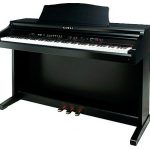The sound of a piano is an undeniable delight, one that adds warmth and sweetness to any home. But maintaining the vibrancy of your piano’s music requires regular tuning – something that can quickly become daunting for even the most seasoned pianists. How often should you be tuning your instrument? What factors will help determine what optimal frequency works best for you? In this post, we’ll take a look at all things tunings: why it matters, how the process works, and tips for getting the most out of your tinkering sessions. Read on to unlock all those sweet chords!
Understanding the basics of tuning a piano
The art of playing a beautifully tuned piano is a skill that requires meticulous attention to detail. However, before you can even begin to master your piano skills, it is essential to understand the basics of tuning. The process of tuning is all about adjusting the tension of the strings to ensure that they play the right note, at the right pitch, and in harmony with each other. Professional piano tuners use a range of instruments and techniques to get the job done, from pitch pipes to digital tuning devices. As a pianist, you don’t necessarily need to be an expert at tuning, but a basic understanding of the principles involved will help you to appreciate the magic of a perfectly tuned piano.
Knowing when it’s time to tune a piano
A piano is an instrument that produces a beautiful melody that can soothe the soul. However, like any other instrument, it needs maintenance and tuning to keep it in optimal condition. Knowing when it’s time to tune a piano can be challenging, especially if you’re not familiar with its sound. The first sign that your piano needs tuning is when it sounds off-key or produces a harsh tone. If you notice that some notes sound louder or softer than others, it’s probable that some strings are out of tune. To ensure that your piano is always in perfect harmony, it’s advisable to have it tuned at least once a year. A well-tuned piano not only produces a melodious sound but also prolongs the instrument’s lifespan.
Recognizing the signs that your piano needs attention
As a pianist, it can be disheartening to realize that your beloved instrument needs some TLC. However, recognizing the signs that your piano requires attention is crucial in maintaining its integrity and preserving its exquisite sound. Some telltale signs that your piano needs work include sticking or non-responsive keys, a change in tone or uneven sound, or difficulty controlling the dynamics of the instrument. By taking action to address these issues early on, you can ensure that your piano will continue to provide you with endless hours of musical enjoyment for years to come. So, don’t hesitate to call a professional technician when your piano starts to show signs of wear and tear – your ears (and fingers) will thank you!
Hiring a professional tuner to ensure quality results
As a car enthusiast, you want your ride to be the best it can be. From the engine to the suspension, you’ve diligently researched and invested in the necessary parts and upgrades. But one often overlooked aspect of high-performance vehicles is tuning. When it comes to ensuring the quality and precision of your vehicle’s tuning, hiring a professional tuner can make all the difference. With their expertise and specialized equipment, they can fine-tune your engine to perfection, resulting in increased horsepower, improved throttle response, and optimal fuel efficiency. Don’t settle for subpar tuning – invest in a professional tuner and experience the difference it can make for your prized possession.
Keeping track of when you last tuned your instrument
As music lovers, we know that tuning our instruments is crucial to producing good sound. However, it can be easy to lose track of when we last did it, especially if we play multiple instruments or go some time without practicing. But fear not, there are simple ways to keep track of your tuning schedule. Consider setting reminders on your phone or computer for each instrument, or keeping a written record in a planner or notebook. With a little bit of organization, you’ll never have to worry about playing out of tune again.
DIY tips for maintaining and tuning your own instrument
Maintaining and tuning your own instrument is not only cost-effective but also a great way to be more connected to your music. As a musician, your instrument is your most valuable tool, and taking good care of it is crucial to ensure its longevity and sound quality. By learning some basic DIY tips, such as changing strings, cleaning and oiling the fretboard, and adjusting the intonation, you can keep your instrument in top shape and enhance your playing experience. Not only that, but maintaining and tuning your own instrument can also give you a deeper understanding of its mechanics, allowing you to appreciate its intricacies and nuances. So why not take the time to learn some DIY tips for maintaining and tuning your own instrument? It will not only save you money and time in the long run but also deepen your connection to your music.

